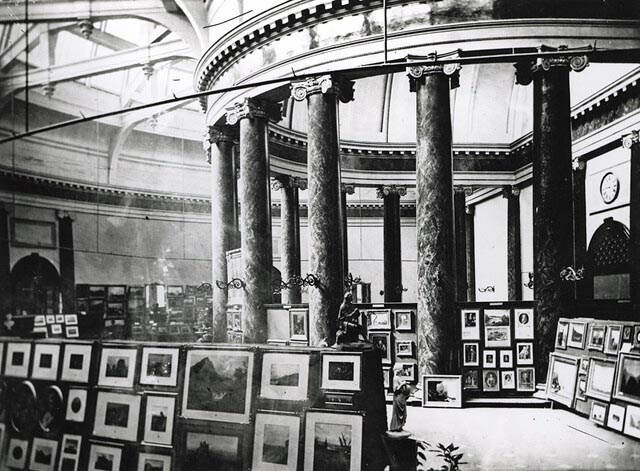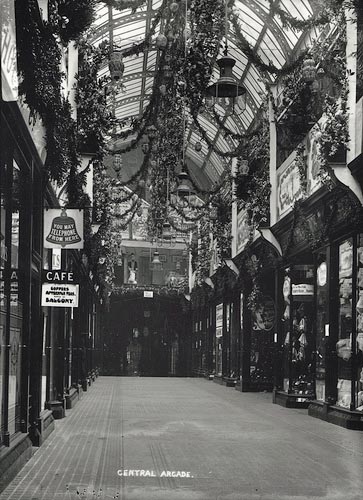We’re all familiar with JG Windows’ music store in the fabulous Edwardian Central Arcade.

Heaton History Group’s Michael Proctor first knew it from searching for records on teenage trips to Newcastle and later from drooling over impossibly expensive hi-fi systems. Others may remember it as the place to buy tickets for almost any conceivable concert or event, from Shakespeare at the Theatre Royal to rock music at the City Hall and even the circus on the Town Moor, but when it first opened its doors it was to sell musical instruments and sheet music. The shop was opened by James Gale Windows, a long term resident of Heaton, so Michael decided to delve a little deeper.
Beginnings
James Gale Windows was born in October 1870 in Headington, Oxfordshire. He was the fourth son of Joseph Windows, a police sergeant and his wife, Fanny. The 1881 census shows the family still living in Cowley, with two more children, a fifth son and a daughter, with Joseph having been promoted to inspector. James’ eldest brother, Alfie, had left home by this time, but William, 18, was a tailor’s apprentice and Herbert, 14, a carpenter’s apprentice.
In his late teens, James moved to Newcastle, where he started work as a music seller’s assistant. The 1891 census shows him boarding with Annie Turnbull in Elswick.
In 1896 James returned home to Cowley to marry Maud Frances Hind, with the couple returning to Newcastle to set up home in Heaton. Maud, born in 1873, was the youngest daughter of Jonathon, a monumental mason, and his wife, Thirza. It seems likely that the families were close and James and Maud knew each other as children, as Jonathon’s death in 1910 shows his address as 17 Princes Street, the former home of Joseph and Fanny Windows.
Heaton
James and Maud’s early family life seems to have involved a lot of movement between houses, but always in Heaton. In 1899, they were living at 57 King John Street; in 1902, they’d moved to 124 Warton Terrace; in 1905 it was 21 Stratford Grove; 1908 saw them at 69 Cardigan Terrace and 1914 has the family living at 8 Norwood Avenue, where they stayed until at least 1927.
The couple’s first son, Maurice James, was born in July 1897 and their second son, Hedley Arnold, was born nine years later on 13 February 1906.
But it was in 1908 when the family’s fortunes really changed and the family name became synonymous with music on Tyneside. That was the date when James opened his own store in the highly prestigious, newly opened Central Arcade.
Exchange
The building itself had had a troubled history. The Central Exchange was intended to be the flagship of the Grainger town development. An unusual triangular shaped building it had facades on Grainger Street, Grey Street and Market Street and was intended to be the visual and commercial centrepiece of Newcastle’s Neo-Classical streets. It was built by Richard Grainger and designed as a Corn Exchange, but by the time it was completed in 1838, there was no need for an exchange. Instead, it opened as a subscription newsroom, where the wealthy gentlemen of the day could come to read newspapers gathered from around the world. Coffee rooms occupied space in the corner drums and the building became a focal point for Newcastle’s social elite.

The fact that the building was not proving to be a great commercial success became apparent in March 1846 when a hand written share prospectus from Richard Grainger proposed to raise additional funds by selling 1,700 shares at £50 each. The prospectus notes that the news room had 1,300 subscribers paying 1 guinea each and produced an annual rent of £674 per annum. It then goes on to propose that a small increase in subscriptions of ½ guinea (50%) would allow the rent to increase to £1356. Grainger then set out the rent from shops, offices and coffee rooms as £1,340. However the premises were not fully occupied. As the additional rent he estimated would come from having the building fully occupied was £2,416, that suggests only about a third were occupied.
In the event, the share scheme was also a failure. Two years later, on 7 April 1848, the Durham County Advertiser reported that shareholders called a meeting with Grainger to hear the findings of a committee appointed to investigate the scheme. The committee recommended the immediate reimbursement of the shareholders. In the event, only 536 shares had actually been sold, with Grainger holding the remainder.
The first incarnation of the Central Exchange ended on Sunday 11 August 1867 when the building was ravaged by fire. When it reopened in 1870 the bulk of the building was occupied by the Institution for Promoting the Fine Arts and included an art gallery, concert hall and theatre.


This appears to have been more successful, but was again brought abruptly to an end by another major fire in 1901. This time, the building was completely redesigned to form an elegant shopping arcade with a barrel vaulted glazed roof, decorated using the full arsenal of Edwardian techniques with lustrous faience tiling, double arched entrances and a mosaic floor.
Arcade
Towards the end of the 19th century, public concerns were raised about the safety, hygiene and moral integrity of the city. One response was to build shopping arcades exclusively to display luxury and novelty goods to the city’s elite customers. The peak of arcade building was around 1890, so the new Central Arcade, which opened to the public in 1906, was unusual in being Edwardian rather than Victorian.

This early photograph shows the arcade lavishly decorated for Christmas with an advert for a cafe on the balcony and even the latest technological advance, a public telephone.
It was into this luxury shopping arcade that James Windows opened the doors of his new business in 1908, just two years after the arcade opened. Originally, he appears to have had only the middle one of the three shopping units that the shop now occupies. Even so, this seems like a massive leap for a music seller’s assistant to open his first shop in such an environment. It’s not clear where he got the funding to do this as there doesn’t appear to have been wealth on either his or his wife’s side of the family that he may have inherited. By 1911, it is obvious that the shop was doing well as the census shows the family had acquired that most essential of Edwardian middle class assets, a servant, Maggie Calder. The census identifies James as a seller of music and musical instruments and an employer. In 1909, James joined the Novocastrian lodge of the Freemasons, further establishing his position within the middle class elite of Newcastle.
War
With the coming of the First World War, James and Maud’s elder son, Maurice, signed up and fought as a private with the Cyclist Battalion. A vital part of the army that subsequently became the Signal Corps, cyclist battalions passed messages to and from the front line. His medal card also shows him having fought with the Northumberland Fusiliers. JG Windows’ own website records that both sons also fought in the Second World War, but no details have emerged. Obviously by the time of the war, the business had branched out into selling gramophones (and presumably records), as the Newcastle Daily Journal of 29 September 1915 records the donation of a gramophone from JG Windows for the use of the troops. It continued to expand to include radios in the 1930s and even provided for music and singing lessons. (The Newcastle Journal on 1 November 1940 records the success of a child prodigy, Maurice Aitcheson aged 14, passing the LRAM Performer exam at the Sigmund Oppenheimer Pianoforte School at JG Windows.)
After the war, Maurice Windows joined his father in the family business, as did Hedley when he was old enough and, later, Hedley and his wife Marjorie’s son, James Bowen Windows, who joined the business in 1961.
Legacy
James Gale Windows died on the 21 June 1933 aged 63. His address is given as 43 Oaklands, Gosforth, having finally moved on from Heaton. He left £7,997 16s 4d (around £380,000 in today’s money) to his widow, Maud, and to Percival Frederick Barras, Accountant. It’s not clear who Mr Barras was, but as he clearly had a call on James’ estate, it’s possible that he may have provided some of the financial backing to set up the business.

The business continued to thrive, led by Maurice, Hedley and James Bowen, expanding ultimately to three shop units in Central Arcade over three floors. At one point, they also had stores in Darlington, York and the Metro Centre, although Darlington and York are now closed.
Maurice died on 12 February 1962 and Hedley on 13 February 1996. In 2006 the company was purchased from the Windows family by three current and former employees and long-time associates. Although the Windows family are no longer involved in the day to day running of the company, J G Windows Ltd has stuck to the principles which have kept the company central to musical life in the North East for more than a hundred years.
Can You Help?
If you know any more about James Gale Windows or the Windows family and especially if you can help us find photographs of any of the people mentioned in this article, we’d love to hear from you. You can contact us either through this website by clicking on the link immediately below the article title or by emailing chris.jackson@heatonhistorygroup.org
Acknowledgements
Researched and written by Michael Proctor of Heaton History Group.
